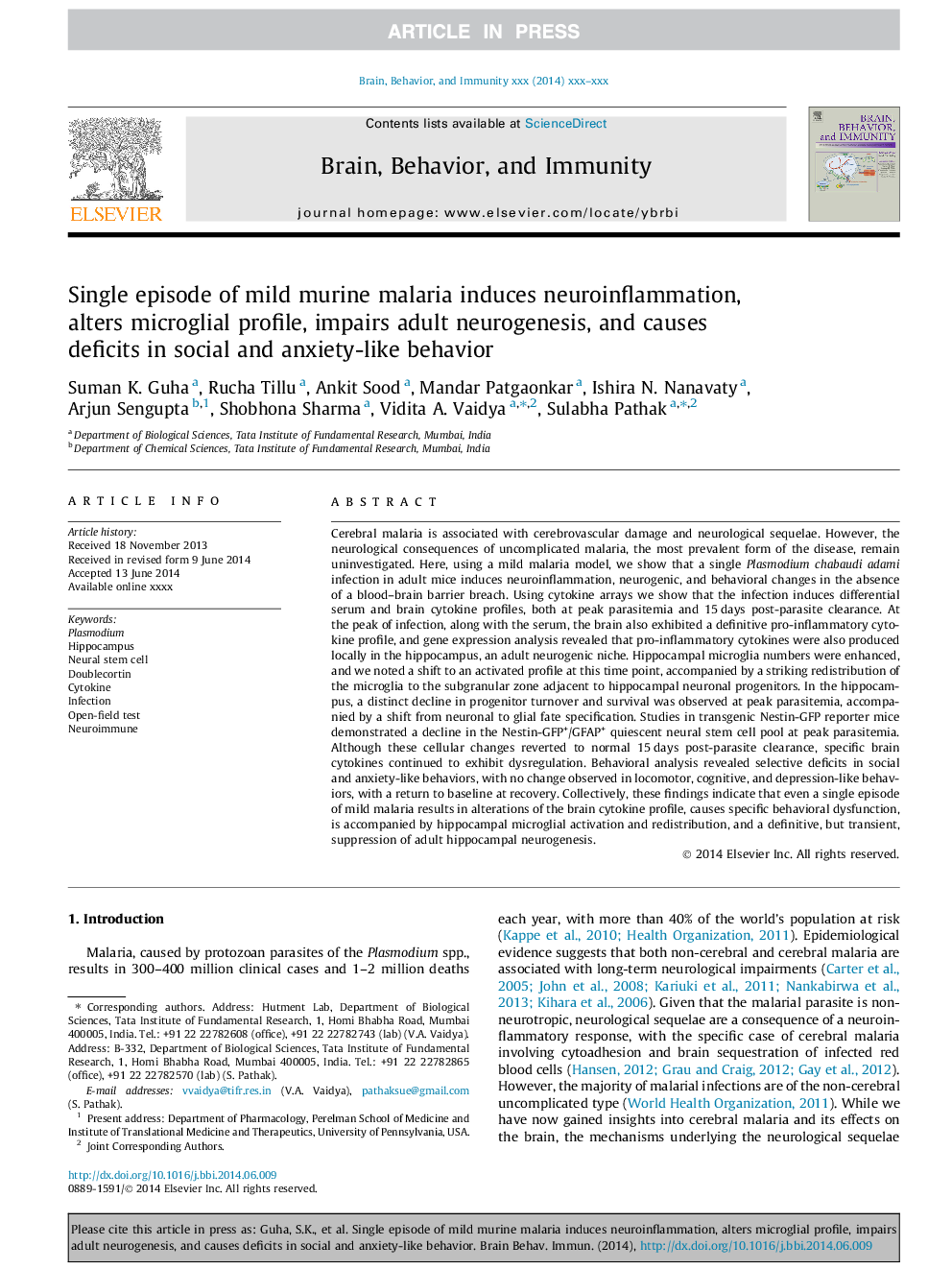| کد مقاله | کد نشریه | سال انتشار | مقاله انگلیسی | نسخه تمام متن |
|---|---|---|---|---|
| 7281533 | 1473925 | 2014 | 15 صفحه PDF | دانلود رایگان |
عنوان انگلیسی مقاله ISI
Single episode of mild murine malaria induces neuroinflammation, alters microglial profile, impairs adult neurogenesis, and causes deficits in social and anxiety-like behavior
ترجمه فارسی عنوان
تنها بخش مالاریا خفیف، التهاب عصبی را ایجاد می کند، مشخصات میکروگیلالی را تغییر می دهد، نوروژنز بالغ را مختل می کند و باعث اختلال در رفتار اجتماعی و اضطراب می شود
دانلود مقاله + سفارش ترجمه
دانلود مقاله ISI انگلیسی
رایگان برای ایرانیان
کلمات کلیدی
پلاسمودیوم، هیپوکامپ، سلول های بنیادی عصبی، دوکورتین، سیتوکین، عفونت، تست باز بودن، نورومیمن،
موضوعات مرتبط
علوم زیستی و بیوفناوری
ایمنی شناسی و میکروب شناسی
ایمونولوژی
چکیده انگلیسی
Cerebral malaria is associated with cerebrovascular damage and neurological sequelae. However, the neurological consequences of uncomplicated malaria, the most prevalent form of the disease, remain uninvestigated. Here, using a mild malaria model, we show that a single Plasmodium chabaudi adami infection in adult mice induces neuroinflammation, neurogenic, and behavioral changes in the absence of a blood-brain barrier breach. Using cytokine arrays we show that the infection induces differential serum and brain cytokine profiles, both at peak parasitemia and 15Â days post-parasite clearance. At the peak of infection, along with the serum, the brain also exhibited a definitive pro-inflammatory cytokine profile, and gene expression analysis revealed that pro-inflammatory cytokines were also produced locally in the hippocampus, an adult neurogenic niche. Hippocampal microglia numbers were enhanced, and we noted a shift to an activated profile at this time point, accompanied by a striking redistribution of the microglia to the subgranular zone adjacent to hippocampal neuronal progenitors. In the hippocampus, a distinct decline in progenitor turnover and survival was observed at peak parasitemia, accompanied by a shift from neuronal to glial fate specification. Studies in transgenic Nestin-GFP reporter mice demonstrated a decline in the Nestin-GFP+/GFAP+ quiescent neural stem cell pool at peak parasitemia. Although these cellular changes reverted to normal 15Â days post-parasite clearance, specific brain cytokines continued to exhibit dysregulation. Behavioral analysis revealed selective deficits in social and anxiety-like behaviors, with no change observed in locomotor, cognitive, and depression-like behaviors, with a return to baseline at recovery. Collectively, these findings indicate that even a single episode of mild malaria results in alterations of the brain cytokine profile, causes specific behavioral dysfunction, is accompanied by hippocampal microglial activation and redistribution, and a definitive, but transient, suppression of adult hippocampal neurogenesis.
ناشر
Database: Elsevier - ScienceDirect (ساینس دایرکت)
Journal: Brain, Behavior, and Immunity - Volume 42, November 2014, Pages 123-137
Journal: Brain, Behavior, and Immunity - Volume 42, November 2014, Pages 123-137
نویسندگان
Suman K. Guha, Rucha Tillu, Ankit Sood, Mandar Patgaonkar, Ishira N. Nanavaty, Arjun Sengupta, Shobhona Sharma, Vidita A. Vaidya, Sulabha Pathak,
